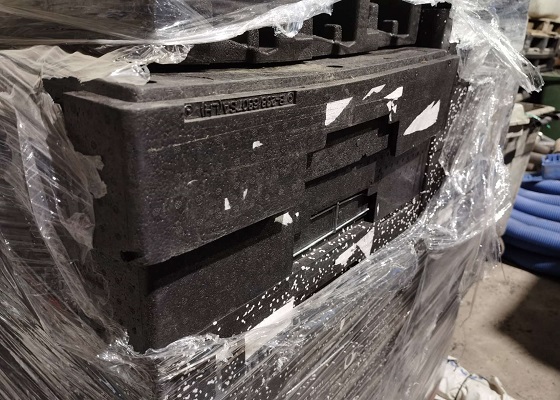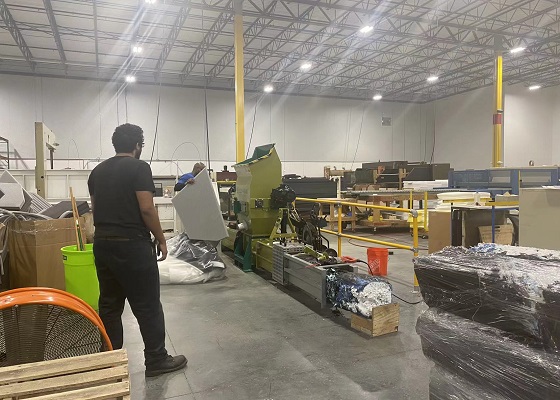EPP Recycling: A Solution to Sustainable Packaging and the Impact of the Plastic Packaging Tax
In recent years, the world has witnessed a growing shift towards more sustainable and environmentally-friendly practices across various industries. One of the sectors at the forefront of this change is packaging, particularly when it comes to Expanded Polypropylene (EPP), a type of plastic that is commonly used in food packaging, insulation, and other consumer goods. With government regulations such as the UK’s Plastic Packaging Tax and global calls for reducing plastic waste, EPP recycling is becoming an essential part of the solution to reduce environmental harm and move towards a circular economy. This article explores the importance of EPP recycling, how technologies like the GREENMAX EPP Recycling Machine are transforming the industry, and the role of the Plastic Packaging Tax in encouraging more sustainable practices.

Understanding EPP and Its Environmental Challenges
Expanded Polypropylene (EPP) is a lightweight, durable material that is widely used in packaging, insulation, and a range of disposable consumer goods. It is favored for its insulating properties and shock resistance, which make it ideal for packaging fragile items such as electronics or perishable goods. However, while EPP offers several benefits, it is also notoriously difficult to recycle due to its bulky and non-biodegradable nature.
One of the most significant environmental challenges associated with EPP is its contribution to plastic waste. When disposed of improperly, EPP can end up in landfills or oceans, where it can take hundreds of years to break down, posing serious risks to wildlife and ecosystems. Furthermore, due to its low density and bulky structure, transporting EPP waste for recycling can be expensive and inefficient. These challenges highlight the need for more effective EPP recycling technologies and systems.
The GREENMAX EPP Recycling Machine: A Game Changer in EPP Waste Management
As the demand for efficient and cost-effective EPP recycling grows, one company that has made significant strides in addressing these challenges is GREENMAX. The GREENMAX EPP Recycling Machine is a highly effective solution for businesses looking to process and recycle EPP waste on-site. By using advanced compaction and extrusion technology, GREENMAX machines can efficiently reduce the volume of EPP waste, making it easier to transport and recycle. The process begins with the EPP being fed into the machine, where it is compressed into dense blocks or pellets. These compacted forms are easier to handle and transport, reducing logistics costs and increasing the overall efficiency of the recycling process.
The GREENMAX EPP Recycling Machine is capable of processing large volumes of EPP waste, which makes it an ideal solution for businesses in industries such as electronics, food packaging, and construction. By recycling EPP materials, companies not only contribute to reducing waste but also lower their carbon footprint and create new opportunities for using recycled EPP in the production of new products. This technology supports the growing need for circular economy practices and is an essential tool in the fight against plastic pollution.

Impact of the Plastic Packaging Tax on EPP Recycling
In 2022, the UK government introduced the Plastic Packaging Tax (PPT) to encourage businesses to reduce their reliance on single-use plastics and increase the amount of recycled content in their packaging. Under this tax, companies that produce or import plastic packaging containing less than 30% recycled content are required to pay a £200 per tonne tax. This policy aims to incentivize businesses to adopt more sustainable packaging practices, including the use of recycled materials and the reduction of plastic waste.
The introduction of the Plastic Packaging Tax has had a significant impact on businesses across the UK. Companies that previously used virgin plastic packaging or low-recycled-content materials now face additional financial burdens. As a result, many businesses are re-evaluating their packaging strategies and exploring alternative materials or solutions, such as recycled EPP, to avoid the tax and meet sustainability goals.
For companies using EPP in their packaging, the tax presents both a challenge and an opportunity. While they may face higher costs for using non-recycled EPP, they can offset these costs by investing in EPP recycling technologies like the GREENMAX machine. By recycling their EPP waste, companies can generate recycled content that can be reintegrated into their production processes, thereby reducing their dependence on virgin materials and avoiding the Plastic Packaging Tax.
Additionally, the tax has created a ripple effect throughout the industry, encouraging innovation in recycling technologies and driving the development of more efficient and sustainable packaging solutions. As more businesses recognize the financial and environmental benefits of recycling, EPP recycling technology, such as the GREENMAX machine, will become increasingly essential to meeting both regulatory requirements and sustainability goals.
Moving Towards a Circular Economy with EPP Recycling
The ultimate goal of EPP recycling is to promote a circular economy, where products and materials are continuously reused, remanufactured, and recycled rather than being discarded. In this system, waste is minimized, and the environmental impact of production and consumption is reduced.
EPP recycling technologies like the GREENMAX EPP Recycling Machine help make this vision a reality by enabling companies to recycle more efficiently and cost-effectively. By incorporating recycled EPP into the production process, companies can reduce their reliance on virgin materials, lower carbon emissions, and contribute to a more sustainable packaging ecosystem.
In addition to the financial and environmental benefits, embracing EPP recycling also helps businesses align with evolving consumer expectations. Consumers are increasingly prioritizing sustainability when making purchasing decisions, and companies that demonstrate a commitment to reducing waste and increasing recycling are likely to gain a competitive edge in the marketplace.
Conclusion: The Future of EPP Recycling
As the world continues to focus on reducing plastic waste and embracing more sustainable practices, EPP recycling will play an increasingly vital role in shaping the future of packaging. Innovations like the GREENMAX EPP Recycling Machine are making it easier and more cost-effective for businesses to recycle EPP waste, reducing environmental impact and supporting the transition to a circular economy.
At the same time, government policies like the Plastic Packaging Tax are creating financial incentives for businesses to adopt more sustainable packaging solutions, driving further demand for efficient recycling technologies. Together, these efforts are helping to create a more sustainable and environmentally-conscious future, where the materials we use today are recycled and reused for tomorrow.
